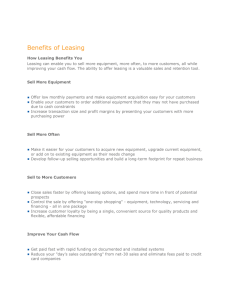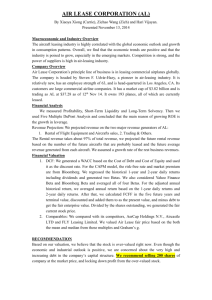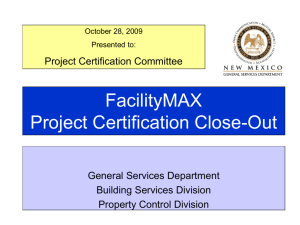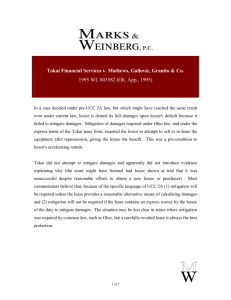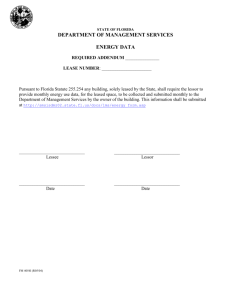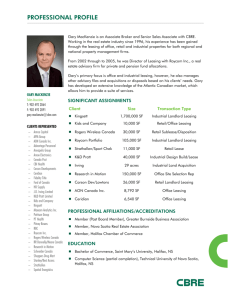Tax aspects of leasing in Georgia
advertisement
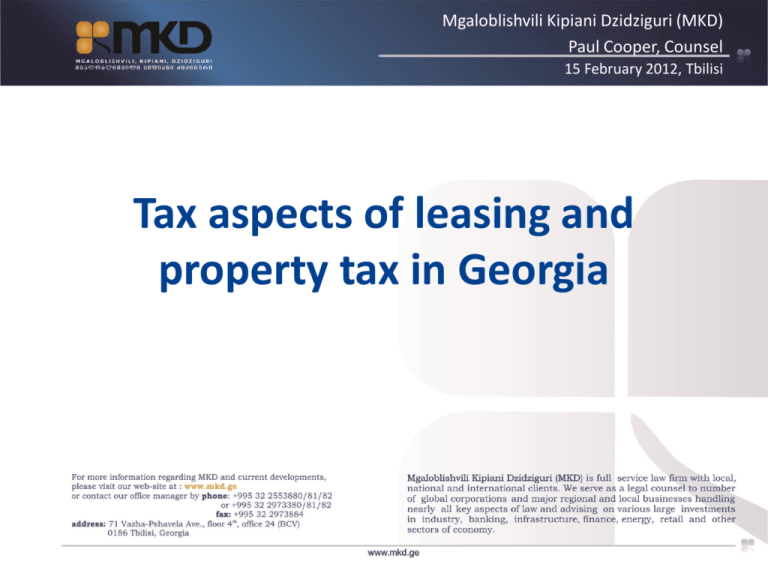
Mgaloblishvili Kipiani Dzidziguri (MKD) Paul Cooper, Counsel 15 February 2012, Tbilisi Tax aspects of leasing and property tax in Georgia Tax aspects of leasing and property tax in Georgia I’m going to mix things up ... Leasing is much more interesting than property tax, so we’ll do that first … My background is tax, so the presentation will touch on legal and accounting considerations only to provide relevant background … Despite the topics, let’s try to have some fun! 2 Tax aspects of leasing and property tax in Georgia Part 1: Lease taxation Tax aspects of leasing and property tax in Georgia What is a lease? Legal ≠ accounting ≠ tax ≠ layman’s concept Contract Owner (lessor) User Property (lessee) (leased object) 4 Tax aspects of leasing and property tax in Georgia Commercial considerations Improves access to financing of equipment; Lessees that may not be able to access bank finance may be able to access leased assets. Lessor may be able to assume larger credit risk, because the lessor owns the equipment and can recover value through repossessing and reselling equipment. Secondary market for previously leased assets may enable new players to acquire equipment. Think about aircraft. 5 Tax aspects of leasing and property tax in Georgia Contract law under Civil Code Ch. 1 – Purchase and sale. Exchange (477-523) Ch. 2 – Donation (524-530) Ch. 3 – Tenancy (531-575) Ch. 4 – Leasing (576-5806) Ch. 5 – Renting (581-591) Ch. 6 – Lease of agricultural land (592-606) Ch. 7 – Franchising (607-614) Ch. 8 – Lend (free use) (615-622) Ch. 9 – Loan (623-628) Ch. 10 – Contract (629-656) 6 Tax aspects of leasing and property tax in Georgia Leasing rules amended Oct 2011 Article 576. Concept – (1) Under a lease contract the Lessor shall be required to transfer certain assets to the lessee in use for a period, envisaged by contract, with or without the right to redeem and the Lessee shall be liable to pay the fee according to specified regularity, provided that: (a) The Lessee identifies the assets and selects the Supplier of the assets from which the assets will be purchased or otherwise obtained; (b) The Lessor purchases assets for leasing and the Supplier is well aware of this fact. (2) The Supplier may also be the Lessor, provided that the ordinary business of the Supplier is the supply or lease of assets. The assets may also be purchased from the Lessee. 7 Tax aspects of leasing and property tax in Georgia Investor or entrepreneur may also be the supplier Art. 576 leasing Supplier Right to enforce warranties Payment for equipment Tripartite agreement Entrepreneur (lessee) Requests finance Investor (lessor) Repay through Rental payments 8 Tax aspects of leasing and property tax in Georgia Key themes for “leasing” Supplier has duty to both lessor and lessee. All parties must agree to contract variations. The Lessee is required to take adequate care of the leased object and to maintain it in good condition, subject to normal tear and wear. The lessor is entitled to return of the asset and to dispose of it at the end of the lease. – Doesn’t preclude predetermined sale to lessee. 9 Tax aspects of leasing and property tax in Georgia How does leasing differ from ... Under a contract of tenancy, the lessor is obliged to transfer a thing to the lessee in use for a definite timeperiod. The lessee is obliged to pay a fixed rental to the lessor. Under a rent, the lessor is obliged to transfer to the lessee a certain property in temporary use and to secure a possibility of obtaining fruits within the period of renting provided they have been obtained as the profit as a result of the proper management of the rented property. … The rules of a contract of tenancy shall apply to a renting contract unless otherwise provided by Article 581-606. 10 Tax aspects of leasing and property tax in Georgia Taxation and leasing Law was amended October 2011 Previous “leasing” definition (Art. 17) was deleted. “Leasing” now means “leasing in the meaning of the Civil Code of Georgia, when the object of lease is a depreciable asset.” (Art. 8.38) “Leasing Company” means “an enterprise for which at least 70% of net income for a tax year is revenues from the lease of assets. (Art. 8.39) 11 Tax aspects of leasing and property tax in Georgia Leasing companies A leasing company may deduct reserve provisions for overdue claims stemming from leasing (Art. 109.3). The annual property tax payment for a leasing company for leased taxable assets may not exceed 0.6% of the initial book value of the leased assets at the inception of the lease (Art. 202.31). 12 Tax aspects of leasing and property tax in Georgia Leasing company – property tax Does 0.6% rule apply to aggregate assets or individual assets? Assume a leased asset costs GEL 10,000 and is depreciated at 20% D.V. for financial reporting: Normal property tax in year one is GEL 900 (based on average of opening and closing book value). Maximum property tax each year is GEL 600. By year three, property tax falls below GEL 600. 13 Tax aspects of leasing and property tax in Georgia Leasing and renting Aside from provisions for leasing companies, leasing and renting are now treated the same way for tax. Implication for non-residents: Exemption for income received from leasing property that does not belong to the nonresident’s PE in Georgia still exists … but the lease would need to fit the more narrow new definition in Art. 576.1 of the Civil Code. 14 Tax aspects of leasing and property tax in Georgia Hold that thought ... Have the legislators and the Revenue Service realised that the new definition of leasing in the Civil Code will also flow through to determining who is liable to account for property tax on “leased” assets? 15 Tax aspects of leasing and property tax in Georgia Taxation of leases (and rent) Lessor depreciates the leased asset: Each fixed asset is treated as a separate group. Depreciation charges are deducted in amount of discounted value of lease payments, calculated with consideration of the lease terms and balance value of the fixed asset. Lessor now entitled to use 100% deduction rule. Lease (rent) payments by lessee are deductible. 16 Tax aspects of leasing and property tax in Georgia Depreciation – implementing rules In January 2012, lessor provided a car under a five-year lease: Value at inception was GEL 23,040 Lease payments are GEL 7,000p.a. (in arrears(!)) Redemption payment defined as GEL 2,630 Implied discount rate is 18%. MOF position: Year 1 finance component is GEL 4,147 (i.e., 23,040 x 18%) Depreciation deduction is GEL 2,853 (i.e., 7,000 – 4,147) Year 2 depreciation will be GEL 3,366, etc. 17 Tax aspects of leasing and property tax in Georgia VAT on leases Follow the transaction: Supplier will make a supply of goods. Lessor renders services. If supply of goods would be VAT exempt without right of credit, provision of those goods under lease will also be VAT exempt without right of credit (Art. 168.2.h) 18 Tax aspects of leasing and property tax in Georgia Cross-border leasing Unless the lease falls under the new definition of financial lease in the Civil Code, 10% withholding tax would generally apply : If the lessor has a PE in Georgia, tax would revert to 15% tax on net income If the lessor does not have a PE, exemption may be available under a tax treaty (depends on definition of “royalties” under treaty). However, RCVAT still applies. Make sure customs documentation is done so that lessee can credit VAT on importation: It appears that there is a double imposition of VAT 19 Tax aspects of leasing and property tax in Georgia Concluding thoughts Property tax on leases still to be discussed. Key issue is that tax effects need to be priced into the lease contract. 20 Tax aspects of leasing and property tax in Georgia Part 2: Property tax Tax aspects of leasing and property tax in Georgia General principles Applies to individuals and legal entities owning or leasing property in Georgia. Property tax is a local tax. Local authorities set the tax rates within limits established by the tax code. In the tax code, land tax falls under the heading of “property tax,” but to all intents and purposes is levied as a separate tax. 22 Tax aspects of leasing and property tax in Georgia Taxable assets For enterprises and entrepreneurs, property tax applies to: Fixed assets, non-assembled equipment, unfinished capital investments and intangible assets listed on their balance sheet. Assets leased to others. Foreign enterprises are subject to property tax on the same type of assets located in Georgia. Organizations (not for profit entities) pay property tax on the same type of assets used in profit-oriented activities. Individuals are also subject to property tax on immovable property. 23 Tax aspects of leasing and property tax in Georgia Business property – general The annual rate for enterprises and organizations should not exceed 1% of the average annual balance sheet value of the taxable assets (excluding land). The balance sheet value is the value reflected in the financial statements of the enterprise. It is not the tax value of the assets. 24 Tax aspects of leasing and property tax in Georgia Business property – leased assets The balance sheet value is adjusted for leased assets: A lessor is required to pay property tax on assets that it has leased to other persons. Leased assets are excluded from the balance sheet of the lessee if the lessor is a Georgian resident. 25 Tax aspects of leasing and property tax in Georgia Business property – coefficients For non-government-owned companies the value is also multiplied by an indexation coefficient based on the age of the assets. Date of acquisition Coefficient Before 2000 (or if no acquisition information is available) 3 From 2000 to 2003 2 In 2004 1.5 An entity does not need to apply coefficients if it has financial statements that record fixed assets using revaluation methods (with the most recent revaluation no more than four years ago) and that have been audited by an approved audit company. 26 Tax aspects of leasing and property tax in Georgia Business property – market value During a tax audit, the tax authorities may substitute market values for the values reflected in the balance sheet. The taxpayer may appeal the assessment. If appeal is unsuccessful, the taxpayer must pay taxes (but not interest and penalties) based on the substituted values for the year(s) in question and for the three succeeding years. 27 Tax aspects of leasing and property tax in Georgia Personal property (excluding land) The annual property tax rate for an individual on taxable property (excluding agricultural land) varies according to the amount of annual family revenue of the individual. The rates are applied to the market value of the taxable property. The following are the annual rates: Annual Family Revenues (GEL) Property tax rate Exceeding Not Exceeding 0 40,000 0% 40,000 100,000 0.05% to 0.2% 100,000 0.8% to 1% The rates are not progressive (e.g., a family with income of GEL 100,001 would pay 0.8% to 1% tax on all property subject to property tax). 28 Tax aspects of leasing and property tax in Georgia Free Industrial Zone (FIZ) All types of assets (including land) situated on the territory of a Free Industrial Zone are exempt from property tax. 29 Tax aspects of leasing and property tax in Georgia Compliance – individuals If the gross income of a family exceeds GEL 40,000: Annual property tax return should be filed before 1 May. The return is filed at the tax authorities based on the individual’s place of tax registration. The tax should be paid before 15 November. 30 Tax aspects of leasing and property tax in Georgia Non-individuals – returns Enterprises must submit property tax returns before 1 April of the year following the year for which tax is being assessed. 31 Tax aspects of leasing and property tax in Georgia Compliance – payments Enterprises pay property tax in two installments. An advance payment is made on 15 June, equal to the property tax payable for the previous year. • If the current tax year tax liability will be 50% or less than the previous year’s liability, the taxpayer may reduce or eliminate the advance payment if it informs the tax authorities by 1 June. • If the reduction in liability does not eventuate, the taxpayer will be subject to a fine (interest) on the underpaid tax. The balance is due before 1 April of the following year, when the property tax return for the year is filed. 32 Tax aspects of leasing and property tax in Georgia Payments – new businesses Enterprises that were incorporated after the beginning of the calendar year are not subject to the advance payment and pay property tax in proportion to the part of the year in which they were active. 33 Tax aspects of leasing and property tax in Georgia “Land tax” Annual property tax rate for agricultural land varies according to the administrative unit and the land quality. The base tax rate per hectare varies from GEL 1.50 to GEL 100. The tax is further adjusted by a territorial coefficient of up to 150%, depending on the location. The base tax rate payable on non-agricultural land that is used for economic activity (including rent) is GEL 0.24 per m2, which is further adjusted by a territorial coefficient not exceeding 1.5. 34 Tax aspects of leasing and property tax in Georgia “Land tax” – exemptions Certain assets are exempt from property tax, including: Roads Communications and electronic transmission wires. Property and land used for activities defined by the Law on “Oil and Gas”. Agricultural land plots not exceeding five hectares in the ownership of an individual as of 1 March 2004 Property of medical establishments used for medical activities, except land that is not under the medical establishment. 35 Tax aspects of leasing and property tax in Georgia Payments – “land tax” The amount of property tax on land is subject to assessment by the authorities. Land tax must be paid before 15 November. 36 Tax aspects of leasing and property tax in Georgia Questions Open forum Specific concerns of participants 37
